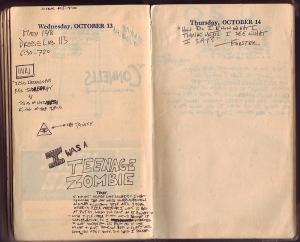
Source: Flickr user Andrew Huff
License
Low-hanging fruit but fruit nonetheless—I stand by (or slink past) my title. I’ve been down on story/plot lately. My reviews have highlighted style and bemoaned our dot-connecting obsession. Fair enough, but narrative has its uses, chief among them parody. The adage is that you have to know the rules to break them—Picasso and all that. Just so, subversion of expectation only works if you have expectations. If McCabe & Mrs. Miller (1971) is your first Western, John Wayne’ll be quite the surprise.
My case study, then, is a movie with no style at all, a film made on such a low budget with so limited a reservoir of technical knowledge that half the audio gets lost in bathroom-dinned echo. This is the sort of piece in which nearly every single conversation is told through shot/reverse shot, with only occasional broadening. By the end, you feel like you’re watching silently, stepping and turning back and forth to make sure you see each speaker square from the front for each line. What testament to the glory of cinema do I mean? I Was a Teenage Zombie (1987).
One reviewer says this John Elias Michalakis flick “takes place in a crappy suburb of Tromaville.” Boy, does it. Lloyd Kaufmann even gets a brief shout out as the first person to fall into a now-irradiated Hudson River. The effects are cheesy. The film stock looks like grainy mustard smeared on Swiss cheese. While watching you don’t know if you’re getting high camp or film school detritus.
At least not until the laughter begins. The target here is the teen movie, especially of the saccharine, John Hughes variety. Horror (of the Troma-derived vintage) is its weapon. And rip and tear it does. The actors themselves don’t matter—all they need to do is ham it up. These aren’t pretty kids. No, they’re 32-year-olds playing high schoolers with less subtlety than even our low standards expect. What’s more, they’re good ole, Jersey yokels—a Fonzie rip-off, a drooling goober, etc. They hang out at a 50s malt shop even though their hometown seems to be in transition from grayed industrial hellscape to overgrown post-industrial seascape. Their antagonist is a Vietnam-vet turned drug dealer named Mussolini (Steve McCoy) who sells “weeds” and talks like if a male Rachel Dolezal based his life on West Side Story (1961). At one point, the rotund member of the gang (again, who knows their names?) answers a teacher’s question about Edgar Allan Poe by saying “excuse me” and jumping out the window. We are not in Kansas anymore; we are in Jersey.
The film’s real innovation is to make zombification mere undeath. They kill Mussolini with a home-run-derby swing and dump his body in the river. He comes back seeking revenge (and continuing to push drugs, though in a slightly different way). Their friend is killed by their undead nemesis. What to do? Why not just dump his body in the river to make a zombie champion? He can live in the basement of the malt shop with a cat. The owner can tell him he’s too ugly for his human girlfriend and slyly hint that he should consider wiping down the counters overnight. Zombie v. zombie for the heart of the US: Vietnam vet or high school student, drug-pushing necromancer or baseball-playing cellar corpse—who will win?
I don’t know, but the movie won my heart. I laughed from beginning to end.
Parody relies on tropes and our ability to identify them, be they stylistic or narrative. I Was a Teenage Zombie only deals in the latter but it’s no less funny for it. I wonder why, then, we don’t have another Toxic Avenger (1984) now? We’re drowning in tropes; the narratives are canned. I’d watch I Was a Teenage Superhero but Have Grown Up to Work in an Amazon Facility, Where I Wear a Diaper and It Is Very Hot. Let me know if you’re planning on making that. I don’t have any money. But I can offer rivers of toxic moral support.













